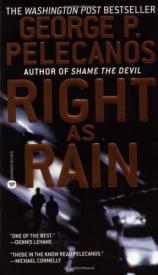Right As Rain
Review
Right As Rain
Things aren't always what they appear to be. Sometimes you see
things as you were programmed to see them and react according to
society's training. That is the belief of Derek Strange, Black
private investigator and ex-cop, while he toils on his latest case.
Hired to open a closed investigation by Leona Wilson, mother of
Chris Wilson, a Black police officer killed in line of duty by
another cop, he soon finds the investigation leads into a spider
web of leads. Leona believes Derek can go deep into the incident to
show Chris was not at fault for his own death.On
the night of the killing, Chris pinned an innocent man on the
ground and held a gun to his head. White Officer Terry Quinn and
his partner arrived on the scene to see a Black man holding a gun
on a White man. With all the tension, Quinn indicated that Chris
never identified himself as a cop and was shot when he turned the
gun toward the officers. On autopsy, Chris's blood alcohol level
came back positive. A White cop shoots an off-duty Black cop, and
much negative publicity, accusations, and racial questions follow.
Quinn was cleared by the department but never by the publicity, so
he quits the DC police force to work in a used bookstore; and
Chris's name remains under a gray haze of innuendo.While Strange is taking a ride with Quinn to discuss the
incident, Strange gets a call to pick up a bail jumper. Quinn
distracts the brother of the jumper by violently knocking him out
--- and realizes he enjoys this and has been missing the adrenaline
rush. Quinn then asks Strange to be involved in this investigation,
one that takes them into the heart of drug operations run among
Hispanics, rednecks, and Blacks, all of whom seem to have mockery
for each other.Pelecanos develops many issues related to socialization.
Primarily, Quinn being programmed since birth to expect a Black man
holding a gun on a White man is up to no good. Quinn didn't listen
and didn't use his police powers of deduction; all he saw was a
Black man with a gun, a criminal, and made up his mind to fire.
Would he have pulled the trigger on a White man?The
issue of stereotypical images, based upon outward color, is one
often played out in entertainment and reality. In RIGHT AS RAIN,
the idea is developed from the onset when Quinn dates a half-Black
and half-Puerto Rican woman and believes it is due to her physical
beauty. Before the shooting, he had been raised fearful of
neighborhoods that are on the opposite side of town. He was taught
not to expect mixing or interracial dating. This sudden interest in
a non-White woman evolves from his insistence that the shooting did
not occur because of the Black and White issue, but because he
feared for his life. Is he trying to make a point to the masses or
to himself?Related issues include becoming criminal as an accident of
birth and environment, where kids have drug dealers as their only
examples and are forced to work for them to get what television
says you should have and to lessen the gap between the haves and
the have-nots. Pelecanos mentions ideas of legalizing drugs and
banning guns to solve the problems of this society as he
illustrates that racial problems and illegal drugs are not confined
to poor neighborhoods.Secondary issues, dealing with relationships and fear of
commitment, tend to add additional intensity to these characters'
lives. The social commentary upon which Pelecanos bases his story
may enlighten the portion of the world that reads quality fiction,
but what of the masses that don't read or find reading
difficult?
Reviewed by Nancy B. Leake on January 23, 2011
Right As Rain
- Publication Date: February 1, 2002
- Genres: Fiction
- Mass Market Paperback: 384 pages
- Publisher: Grand Central Publishing
- ISBN-10: 0446610798
- ISBN-13: 9780446610797





